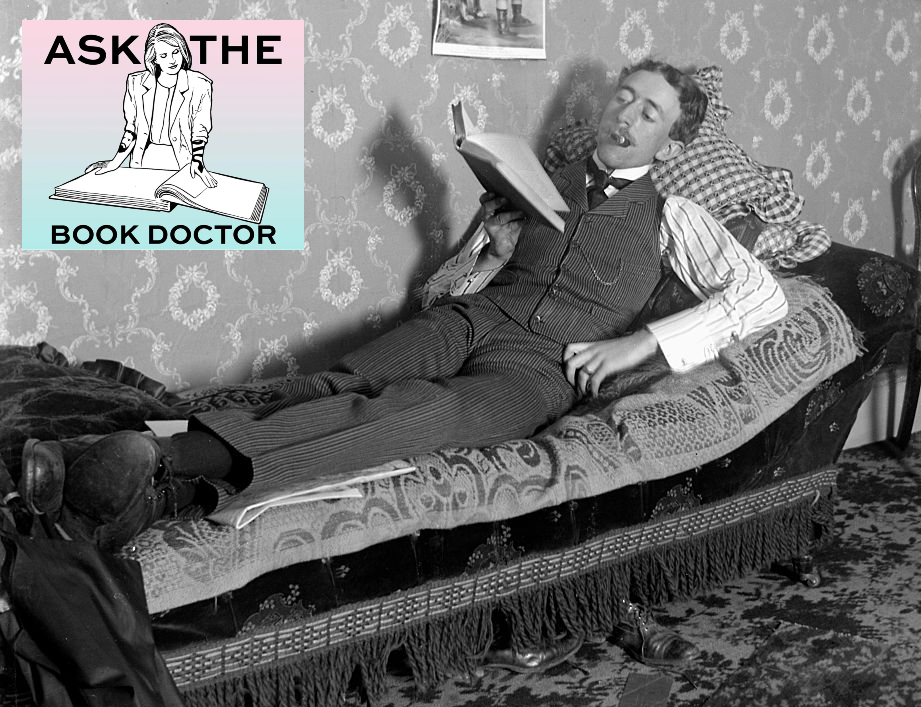Welcome to Ask The Book Doctor, a recurring series about books and reading them.
It can be nice to have a solid brand. For example, I always order the same drinks at the bar, so if I am running late, and I ask someone to order for me, I always get what I want, because I always want the same thing. But because I am consistent, people sometimes freak out when I choose something else. A week or so ago, I ordered a different drink at the bar, and everyone acted like I had two heads! The expectations people have of what I like, then, are determining the kinds of recommendations and information people give to me. No one told me the fancy little whiskey cocktail was so good, because no one thought I would want it!
This can be true for book recommendations, too. If you're really specific about what you like and dislike, it becomes easier for people to recommend things to you. I love third-person fiction, and people often recommend this to me. That means that I have a ton of books in my stacks and on my list to read that I will probably like. But this becomes a problem if you are trying to expand your horizons a little. You still have preferences, but what do those preferences look like in the context of another genre or vibe or length than you usually read? Luckily, I am here to help.
The Case:
Today's patient is Aaron. Aaron's problems began because of envy. Relatable! I get envious of how my friends read all the time! You see, Aaron has a cousin who reads exclusively non-fiction, and Aaron wants to read non-fiction too. "I predominantly read novels and only incidentally read non-fiction books. Like maybe one a year," Aaron wrote. "I do read lots of short-form news and essays and blogs, but I miss the depth of subject knowledge afforded by a few hundred pages compared to a few thousand words. I want to improve my book game."
You might be thinking, Why doesn't he just ask his non-fiction reading cousin for book recommendations? It's a good question, but Aaron explained that his cousin reads highly academic non-fiction, and what Aaron wants is more to the tune of "informative and absorbing, maybe without a high barrier to entry."
He has a few subject restrictions as well: No true crime and no Krakauer-esque tragedies. He also notes that he prefers a non-fiction book to be specific rather than sprawling, which makes sense to me from a reader of mainly fiction. He wants to be told a story about a specific time and place and people.
The Prescription:
What Aaron is seeking, in my expert opinion, is narrative non-fiction. He wants to learn stuff and read facts, but not in a boring way, and he wants to be told a story. At its best, narrative non-fiction reads like a novel and also ruins your life because it makes you really, really mad about the world that you live in.
My instinct was to prescribe him Adrian Nicole LeBlanc's Random Family: Love, Drugs, Trouble, and Coming of Age in the Bronx, which is one of my all-time favorite works of narrative non-fiction. LeBlanc's book is haunting and gorgeous piece of reported narrative non-fiction that follows the life of a single family in the Bronx. But a good doctor does not trust her instinct without double-checking. Ultimately, I am more like Aaron than his cousin. I read a lot of fiction. Probably two-thirds of my book-length reading is fiction, which means that again, we need a second opinion. So I reached out to my friend and narrative non-fiction author, Megan Greenwell.
Megan's new book, Bad Company: Private Equity and the Death of the American Dream, would honestly be a good recommendation for Aaron, but I told Megan she wasn't allowed to recommend her own book and instead must choose another. Megan immediately said that what she loved about Aaron's request is "that he wants books with specificity, which makes me think he just needs to work his way through the canon of great narrative non-fiction. What I love about narrative non-fiction is you're telling a small story that illuminates something much bigger rather than doing an overview of an issue." She said that Random Family would be in her canon of greats, but is not where she would start.
I respect specialists, so I am prescribing to Aaron Megan's recommendation: The Spirit Catches You and You Fall Down: A Hmong Child, Her American Doctors, and the Collision of Two Cultures by Anne Fadiman.
The book was published in 1991 and is set among a Laotian community in Central California. It is about the clash between the Western medicine system, which understands epilepsy as a disease that can be cured, and the Laotian community, which views epilepsy as a gift. "It's really about one family going through this very elaborate medical saga," Megan told me. "I've read it several times, and the details stick out so profoundly even though I probably haven't read it in five years. It feels the opposite of so much of non-fiction that's at arm's length."
I think this is a great recommendation for Aaron, and I hope it will cure his issue by giving him a book he can really dig into and enjoy. I, too, have ordered this book, because Megan's recommendation was so convincing to me. Good luck, Aaron! And please report back!
If you need a consult from the Book Doctor for any of your book dilemmas, please email bookdoctor@defector.com.






